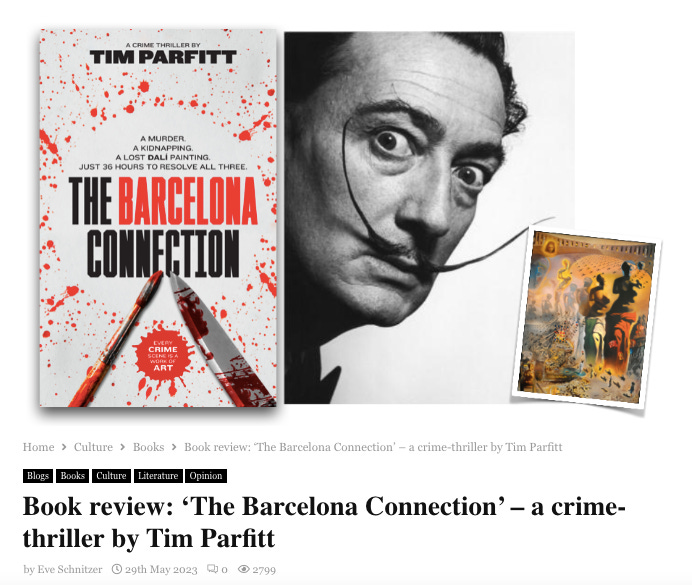Letter from Spain #30
A gamble too far? The ruthless ambition of Pedro Sánchez ... plus TBC notes & research
Barring any last-minute surprises, such as the storming of the Spanish parliament by fascists and/or ‘Cayetanos’, Pedro Sánchez will once again be officially voted in as prime minister this coming Thursday 16 November. He will achieve what he wanted to cling on to since first becoming PM back in June 2018: power.
I can understand - up to a point - the anger of those who oppose him.
This is a man who has said that granting an amnesty to all those facing legal action for their involvement in the 2017 Catalan illegal referendum and other actions carried out between 2012 and 2023 will be ‘positive for Spain’ because it will calm the waters inside Catalonia. He has insisted that amnesty is in the ‘interest of Spain, and in defence of co-existence between Spaniards’. Previously, however, he’d repeatedly rejected amnesty as being ‘unacceptable’ and ‘unconstitutional’ - and in order to govern now, he has to depend on the support of the fugitive Carles Puigdemont, whom he wrote off earlier this year as ‘history’.
So, no one believes that Sánchez is granting an amnesty out of political necessity; it is simply his ruthless ambition to cling on to another term in office. I can therefore understand those who are protesting against him, and who mistrust him - but I also feel that their anger is perhaps based blindly on the fact that ‘Mr. Handsome’ has again won, rather than on the finer details of what is still just a ‘proposal’ of amnesty (at the most, a ‘draft bill’) - and which might never even become a reality.
Let me try to clarify what I mean:
Sánchez clearly likes a risk. He likes to gamble, politically, and he’s won many times in the past. He’s a politician - a ruthless one - and he’s certainly seen off several ‘opponents’ over the years: Susana Díaz (for the PSOE leadership); Mariano Rajoy (ousting him as PM through a vote of no confidence); Albert Rivera (former leader of the Cs party, now ‘kaput’); Pablo Casado (Rajoy’s successor to lead the PP); Pablo Iglesias (former Podemos leader and Sánchez’s deputy PM, when it suited him) - and now also Alberto Núñez Feijóo (Casado’s successor and despite winning the most votes in the 23 July general election, still unable to form a government).
Sánchez’s coalition government had already granted pardons to several jailed leaders of the Catalan independence movement back in June 2021. That was a gamble and it also provoked nationwide protests across Spain - but it paid off, and it certainly helped to defuse the Catalan political crisis.
This time Sánchez, with the promise of introducing an ‘amnesty bill’ and blanket pardoning to win the support of the JxCat and ERC parties - for his own political gain - is clearly playing with fire. But yet again, I believe it will pay off … at least for him, politically. As I have written here before, I don’t think granting an amnesty will ever lead to another Catalan referendum - and those who are protesting about the fear of Spain being ‘broken up’ are wasting their time.
All Sánchez has done is secure the support of the Catalan JxCat and ERC parties, as well as the Basque, Galician and Canary Islands MPs, in addition, of course, to the Sumar alliance of left-wing parties - in order to be voted in officially as prime minister again. He’s done it with just the ‘promise’ of introducing this ‘draft amnesty bill’. By doing so, he’s left the PP and Vox alone and together.
Under the deal signed on Thursday between the PSOE socialists and JxCat, both parties have recognised their vastly different points of view on the Catalan political conflict but have ‘agreed to work together to resolve it’. JxCat has said it will propose holding another self-determination referendum but not do it unilaterally, as in 2017. Instead, it would be under Article 92 of the Constitution, which would require the authorisation of the Spanish prime minister, the Spanish Congress and the king – and that ain’t gonna happen.
As for the amnesty, it seems that the entire Spanish judiciary has already condemned it, arguing that a blanket amnesty would undermine the rule of law and contradict the settled judgment that the 2017 referendum was indeed illegal. Any ‘blanket pardoning’ will be challenged in the courts - the PP and Vox opposition parties will see to that - and anything that ends up in the Spanish courts can take years to resolve. Even the European Commission is keeping an eye on things, with Didier Reynders, the EU’s justice commissioner, having written to Sánchez expressing his ‘serious concerns’ about the proposed amnesty law. Personally, I think Sánchez will be careful not to piss off the EU as I’m sure his ambitions include a top role there in the future …
I’m not saying the amnesty won’t happen, but it might not. What I am saying is that I don’t think Sánchez will care either way in the end. He’s already secured another term in office. He’s also secured leaving the PP and Vox out on their own (with a Navarra MP), with the PSOE having the support of all other parties. And if the amnesty doesn’t go through, thanks to the right-wing and far-right, then the polarisation of Spanish politics will become even greater.
Sánchez’s ability to govern will remain dependent on his new allies, of course - but I don’t think any of them will wander off course and support the PP and Vox to force him out of office. Like him or not, that’s politics for you, and that’s his ruthlessness.
I spoke about Sánchez, Puigdemont and the amnesty issue on the radio this week, in my fortnightly chat with Giles Brown on Talk Radio Europe - although this was before the PSOE-JxCat agreement had been signed. Here’s the chat from Wednesday 8 November if you’re interested:
The Barcelona Connection - Research
I’ll be back next week with further notes and comments regarding the research, locations and characters in The Barcelona Connection …
Previous links to my research notes are here:
Chapter 36 in Letter from Spain #29 (Hotel Arts & Port Olímpic).
Chapter 29 in Letter from Spain #28 (Nîmes to Barcelona and tollgates).
Chapters 28 and 32 in Letter from Spain #27 (Pedralbes and Jaume, the Marquès de Guíxols).
Chapter 26 in Letter from Spain #26 (pijos and Beltrán Gómez de Longoria).
Chapter 25 (again) in Letter from Spain #25 (Benjamin’s thoughts on Púbol, Figueres and Port Lligat-Cadaqués).
Chapter 25 in Letter from Spain #23 (Benjamin and Elena on the Passeig Marítim).
Chapter 22 & Chapter 24 in Letter from Spain #22 (Plaça Sant Jaume & Nîmes).
Chapter 21 in Letter from Spain #21 (the Museu Nacional d’Art de Catalunya - MNAC).
Chapter 18 in Letter from Spain #20 (Nîmes).
Chapter 16 in Letter from Spain #19 (Marta Soler visiting the offices of La Vanguardia).
Chapter 15 in Letter from Spain #18 (Sants, Les Corts and the Plaça de la Concòrdia).
Chapter 14 in Letter from Spain #17 (introducing Inspector Vizcaya and Marta Soler).
Chapter 13 in Letter from Spain #16 (the painting - the possible study of The Hallucinogenic Toreador by Salvador Dalí).
Chapters 10 and 12 in Letter from Spain #15 (Isabel Bosch and Lieutenant Trias).
Chapters 8 and 11 in Letter from Spain #14 (Benjamin at Girona Airport and finding the Marqueses’ home in La Bisbal).
Chapter 7 in Letter from Spain#12 (Séverin and Jürgen).
Chapter 5 in Letter from Spain#11 (Elena in Girona).
Chapters 3-4 in Letter from Spain#9 (Marcos Constantinos in Hampstead, plus Benjamin at the UEA & Stansted).
Chapter 2 in Letter from Spain#8 (the home of the Marqueses de Guíxols, not far from La Bisbal d’Empordà).
Chapter 1 in Letter from Spain#7 (Benjamin waking up at the service station).
The Barcelona Connection - Reviews, News & Events
Links to reviews & articles
A review of The Barcelona Connection by Michael Eaude has been published in the October edition of Catalonia Today.
‘Short, fast-moving scenes and the deft joining of two completely different plots … the novel is not just breathlessly rapid and action-packed, but overflows with humour and satire.’
‘The excellent plotting, the local knowledge, the surreal humour, the political satire and the speed of events … it’s an admirable and very readable crime novel.’
Here’s the link for a review of The Barcelona Connection by Dominic Begg that came out in La Revista, a publication of the British-Spanish Society.
‘The Barcelona Connection is a fast-moving page-turner with a helter-skelter plot.’
‘The background to this thriller is realistic and familiar to those who know Barcelona well. It’s a world of cynical, ambitious politicians; civil servants promoted via enchufe; friction between Spanish and Catalan investigators; disruptive anti-capitalist activists; bumbling US dignitaries and security guards; the continuing influence of old supporters of Franco; the soulless 21st century, exemplified by apartment hotels seemingly without human staff-members …’
Here’s a link to a review of the book by Eve Schnitzer published by the Spain in English online newspaper.
‘Tim Parfitt very cleverly weaves together two parallel though quite different stories, set against the background of a contemporary Barcelona that is even busier than usual with major international meetings.’
‘Two plot lines interweave, with some highly ironic as well as suspenseful results … this book has a lot to offer the reader, from pure entertainment to solid information and, possibly, a fuller understanding of the complexities of Spain and Catalonia in particular.’
Here’s the link to an article I was asked to write for The Art Newspaper about my research on Salvador Dalí.
You can also click here for the latest reviews on Amazon, as well as on Goodreads and at Barnes & Noble.
The book is available on Amazon or you can also click here to choose where else to order your copy from. It can also be ordered from any bookshop simply by giving the ISBN number: 978-1-7393326-1-7.
You can also click here for the Kindle edition of A Load of Bull - An Englishman’s Adventures in Madrid.
For professional enquiries and foreign rights for The Barcelona Connection, please contact my agent Justyna Rzewuska at the Hanska Literary & Film Agency.







